Business Ethics Position Paper: Ethical Duties of Multinational Firms
VerifiedAdded on 2023/06/15
|8
|1823
|53
Essay
AI Summary
This position paper argues that multinational corporations (MNCs) have an ethical obligation to contribute to poverty-stricken nations where they conduct business, countering the argument that their sole purpose is profit. It highlights that businesses operate within society and utilize its resources, thus necessitating a responsibility to give back. The paper refutes the notion that merely providing employment is sufficient, emphasizing the importance of corporate social responsibility and corporate governance. Examples of companies like Pfizer and IKEA are cited to demonstrate proactive engagement in addressing poverty and social issues. Furthermore, the paper contends that engaging in such activities can enhance a company's reputation, attract investment, and ultimately increase revenues, thereby aligning ethical behavior with financial success. The conclusion reinforces the idea that MNCs benefit from poverty eradication efforts and should actively participate in such initiatives, even beyond their direct operational areas.

qwertyuiopasdfghjklzxcvbnmqwertyui
opasdfghjklzxcvbnmqwertyuiopasdfgh
jklzxcvbnmqwertyuiopasdfghjklzxcvb
nmqwertyuiopasdfghjklzxcvbnmqwer
tyuiopasdfghjklzxcvbnmqwertyuiopas
dfghjklzxcvbnmqwertyuiopasdfghjklzx
cvbnmqwertyuiopasdfghjklzxcvbnmq
wertyuiopasdfghjklzxcvbnmqwertyuio
pasdfghjklzxcvbnmqwertyuiopasdfghj
Business Ethics
Position Paper
31-Mar-18
(Student Details: )
opasdfghjklzxcvbnmqwertyuiopasdfgh
jklzxcvbnmqwertyuiopasdfghjklzxcvb
nmqwertyuiopasdfghjklzxcvbnmqwer
tyuiopasdfghjklzxcvbnmqwertyuiopas
dfghjklzxcvbnmqwertyuiopasdfghjklzx
cvbnmqwertyuiopasdfghjklzxcvbnmq
wertyuiopasdfghjklzxcvbnmqwertyuio
pasdfghjklzxcvbnmqwertyuiopasdfghj
Business Ethics
Position Paper
31-Mar-18
(Student Details: )
Paraphrase This Document
Need a fresh take? Get an instant paraphrase of this document with our AI Paraphraser
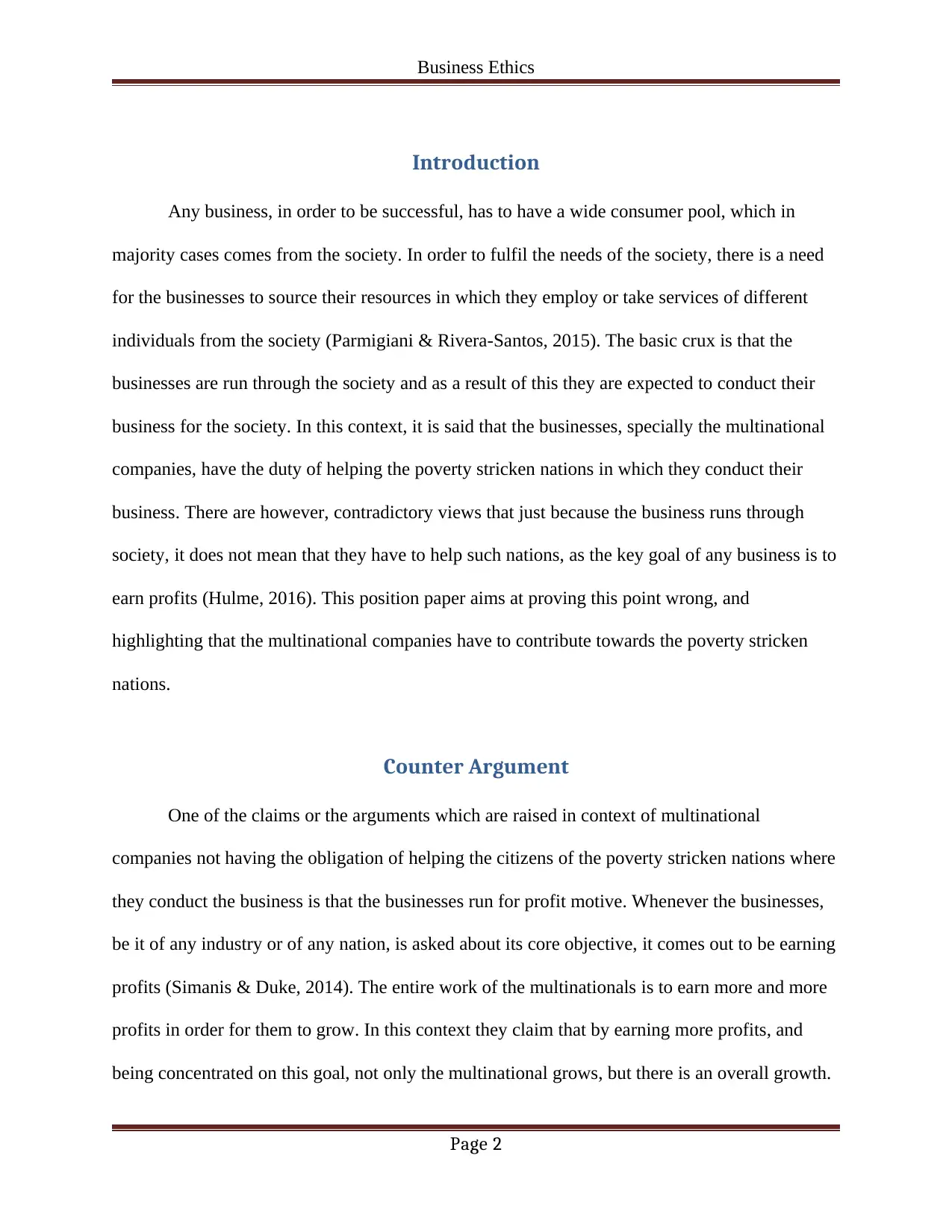
Business Ethics
Introduction
Any business, in order to be successful, has to have a wide consumer pool, which in
majority cases comes from the society. In order to fulfil the needs of the society, there is a need
for the businesses to source their resources in which they employ or take services of different
individuals from the society (Parmigiani & Rivera-Santos, 2015). The basic crux is that the
businesses are run through the society and as a result of this they are expected to conduct their
business for the society. In this context, it is said that the businesses, specially the multinational
companies, have the duty of helping the poverty stricken nations in which they conduct their
business. There are however, contradictory views that just because the business runs through
society, it does not mean that they have to help such nations, as the key goal of any business is to
earn profits (Hulme, 2016). This position paper aims at proving this point wrong, and
highlighting that the multinational companies have to contribute towards the poverty stricken
nations.
Counter Argument
One of the claims or the arguments which are raised in context of multinational
companies not having the obligation of helping the citizens of the poverty stricken nations where
they conduct the business is that the businesses run for profit motive. Whenever the businesses,
be it of any industry or of any nation, is asked about its core objective, it comes out to be earning
profits (Simanis & Duke, 2014). The entire work of the multinationals is to earn more and more
profits in order for them to grow. In this context they claim that by earning more profits, and
being concentrated on this goal, not only the multinational grows, but there is an overall growth.
Page 2
Introduction
Any business, in order to be successful, has to have a wide consumer pool, which in
majority cases comes from the society. In order to fulfil the needs of the society, there is a need
for the businesses to source their resources in which they employ or take services of different
individuals from the society (Parmigiani & Rivera-Santos, 2015). The basic crux is that the
businesses are run through the society and as a result of this they are expected to conduct their
business for the society. In this context, it is said that the businesses, specially the multinational
companies, have the duty of helping the poverty stricken nations in which they conduct their
business. There are however, contradictory views that just because the business runs through
society, it does not mean that they have to help such nations, as the key goal of any business is to
earn profits (Hulme, 2016). This position paper aims at proving this point wrong, and
highlighting that the multinational companies have to contribute towards the poverty stricken
nations.
Counter Argument
One of the claims or the arguments which are raised in context of multinational
companies not having the obligation of helping the citizens of the poverty stricken nations where
they conduct the business is that the businesses run for profit motive. Whenever the businesses,
be it of any industry or of any nation, is asked about its core objective, it comes out to be earning
profits (Simanis & Duke, 2014). The entire work of the multinationals is to earn more and more
profits in order for them to grow. In this context they claim that by earning more profits, and
being concentrated on this goal, not only the multinational grows, but there is an overall growth.
Page 2
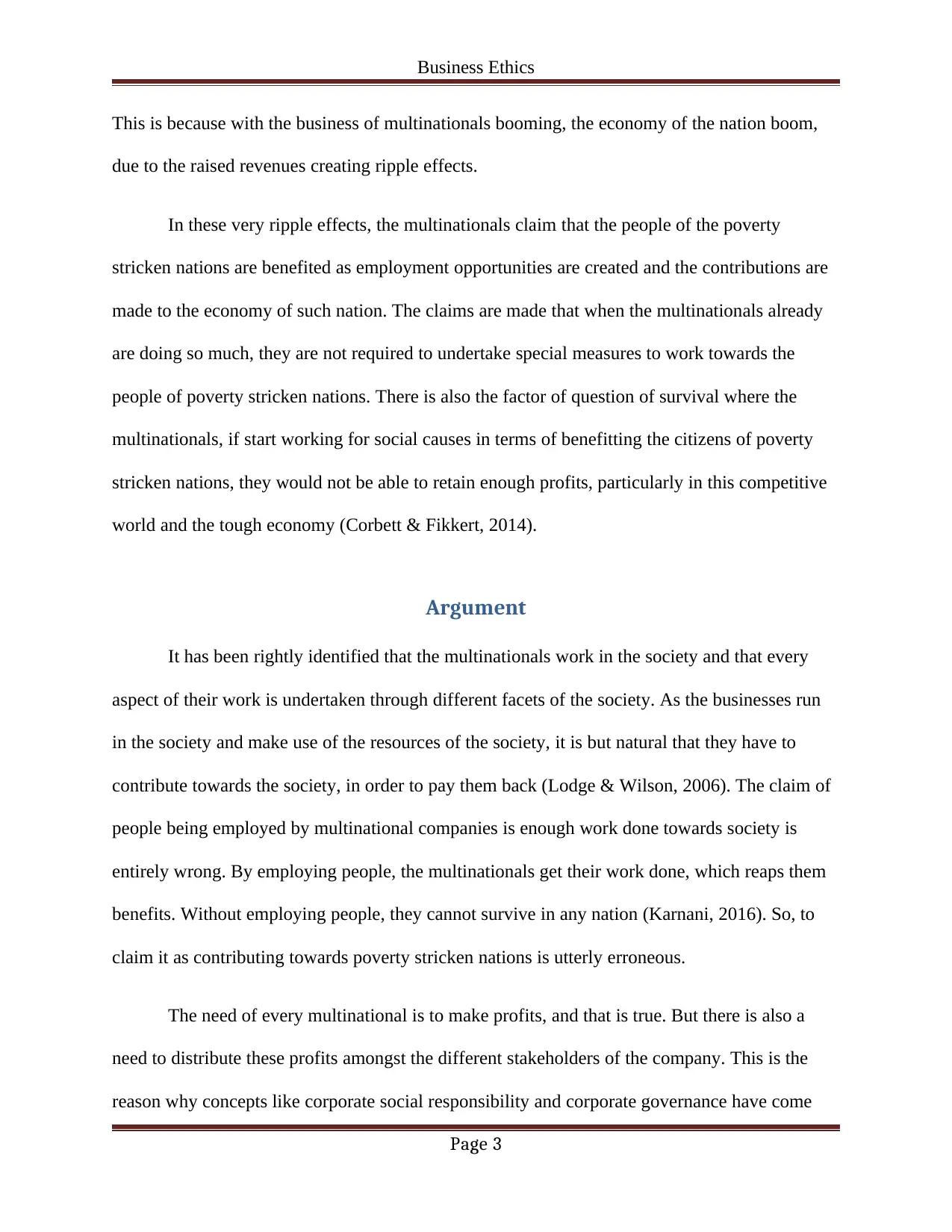
Business Ethics
This is because with the business of multinationals booming, the economy of the nation boom,
due to the raised revenues creating ripple effects.
In these very ripple effects, the multinationals claim that the people of the poverty
stricken nations are benefited as employment opportunities are created and the contributions are
made to the economy of such nation. The claims are made that when the multinationals already
are doing so much, they are not required to undertake special measures to work towards the
people of poverty stricken nations. There is also the factor of question of survival where the
multinationals, if start working for social causes in terms of benefitting the citizens of poverty
stricken nations, they would not be able to retain enough profits, particularly in this competitive
world and the tough economy (Corbett & Fikkert, 2014).
Argument
It has been rightly identified that the multinationals work in the society and that every
aspect of their work is undertaken through different facets of the society. As the businesses run
in the society and make use of the resources of the society, it is but natural that they have to
contribute towards the society, in order to pay them back (Lodge & Wilson, 2006). The claim of
people being employed by multinational companies is enough work done towards society is
entirely wrong. By employing people, the multinationals get their work done, which reaps them
benefits. Without employing people, they cannot survive in any nation (Karnani, 2016). So, to
claim it as contributing towards poverty stricken nations is utterly erroneous.
The need of every multinational is to make profits, and that is true. But there is also a
need to distribute these profits amongst the different stakeholders of the company. This is the
reason why concepts like corporate social responsibility and corporate governance have come
Page 3
This is because with the business of multinationals booming, the economy of the nation boom,
due to the raised revenues creating ripple effects.
In these very ripple effects, the multinationals claim that the people of the poverty
stricken nations are benefited as employment opportunities are created and the contributions are
made to the economy of such nation. The claims are made that when the multinationals already
are doing so much, they are not required to undertake special measures to work towards the
people of poverty stricken nations. There is also the factor of question of survival where the
multinationals, if start working for social causes in terms of benefitting the citizens of poverty
stricken nations, they would not be able to retain enough profits, particularly in this competitive
world and the tough economy (Corbett & Fikkert, 2014).
Argument
It has been rightly identified that the multinationals work in the society and that every
aspect of their work is undertaken through different facets of the society. As the businesses run
in the society and make use of the resources of the society, it is but natural that they have to
contribute towards the society, in order to pay them back (Lodge & Wilson, 2006). The claim of
people being employed by multinational companies is enough work done towards society is
entirely wrong. By employing people, the multinationals get their work done, which reaps them
benefits. Without employing people, they cannot survive in any nation (Karnani, 2016). So, to
claim it as contributing towards poverty stricken nations is utterly erroneous.
The need of every multinational is to make profits, and that is true. But there is also a
need to distribute these profits amongst the different stakeholders of the company. This is the
reason why concepts like corporate social responsibility and corporate governance have come
Page 3
⊘ This is a preview!⊘
Do you want full access?
Subscribe today to unlock all pages.

Trusted by 1+ million students worldwide
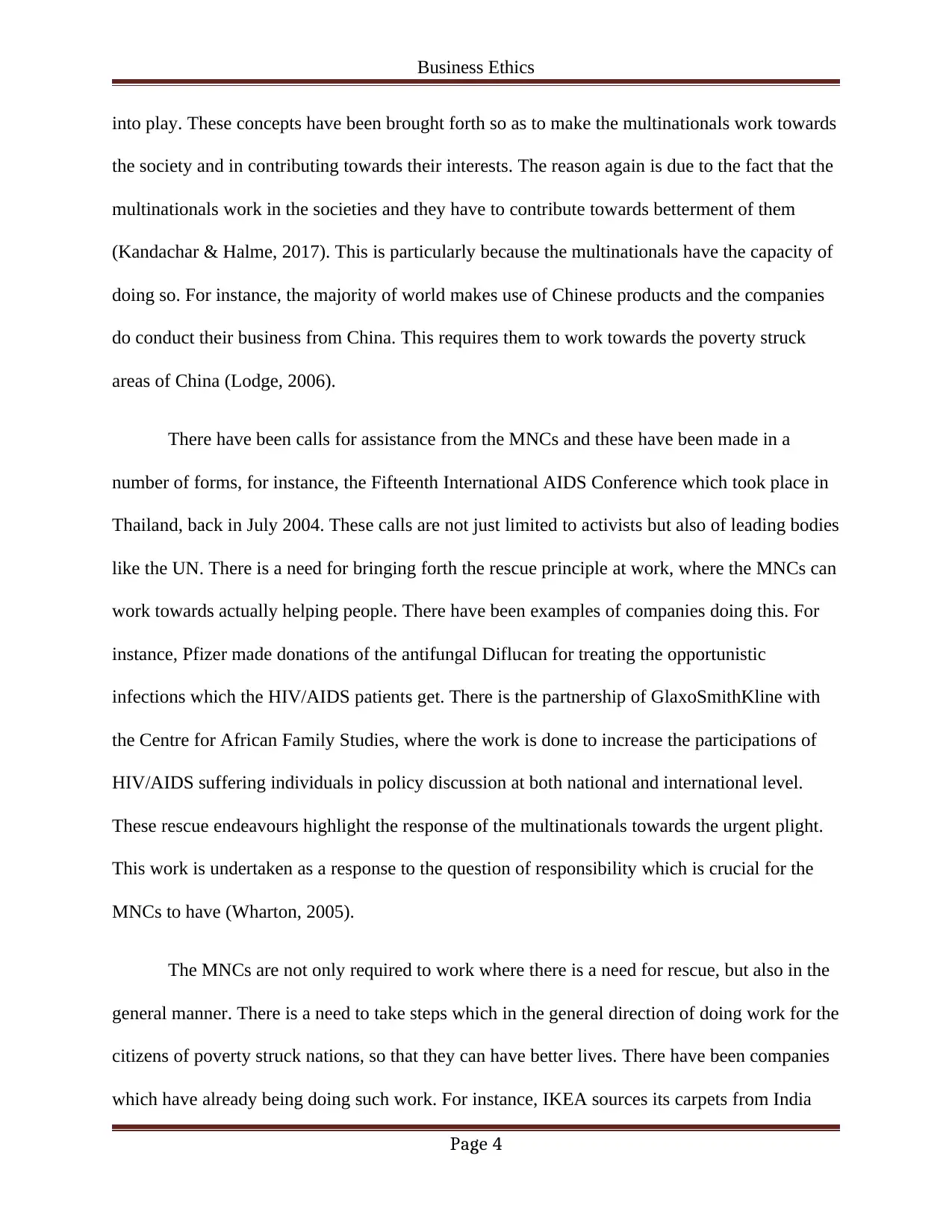
Business Ethics
into play. These concepts have been brought forth so as to make the multinationals work towards
the society and in contributing towards their interests. The reason again is due to the fact that the
multinationals work in the societies and they have to contribute towards betterment of them
(Kandachar & Halme, 2017). This is particularly because the multinationals have the capacity of
doing so. For instance, the majority of world makes use of Chinese products and the companies
do conduct their business from China. This requires them to work towards the poverty struck
areas of China (Lodge, 2006).
There have been calls for assistance from the MNCs and these have been made in a
number of forms, for instance, the Fifteenth International AIDS Conference which took place in
Thailand, back in July 2004. These calls are not just limited to activists but also of leading bodies
like the UN. There is a need for bringing forth the rescue principle at work, where the MNCs can
work towards actually helping people. There have been examples of companies doing this. For
instance, Pfizer made donations of the antifungal Diflucan for treating the opportunistic
infections which the HIV/AIDS patients get. There is the partnership of GlaxoSmithKline with
the Centre for African Family Studies, where the work is done to increase the participations of
HIV/AIDS suffering individuals in policy discussion at both national and international level.
These rescue endeavours highlight the response of the multinationals towards the urgent plight.
This work is undertaken as a response to the question of responsibility which is crucial for the
MNCs to have (Wharton, 2005).
The MNCs are not only required to work where there is a need for rescue, but also in the
general manner. There is a need to take steps which in the general direction of doing work for the
citizens of poverty struck nations, so that they can have better lives. There have been companies
which have already being doing such work. For instance, IKEA sources its carpets from India
Page 4
into play. These concepts have been brought forth so as to make the multinationals work towards
the society and in contributing towards their interests. The reason again is due to the fact that the
multinationals work in the societies and they have to contribute towards betterment of them
(Kandachar & Halme, 2017). This is particularly because the multinationals have the capacity of
doing so. For instance, the majority of world makes use of Chinese products and the companies
do conduct their business from China. This requires them to work towards the poverty struck
areas of China (Lodge, 2006).
There have been calls for assistance from the MNCs and these have been made in a
number of forms, for instance, the Fifteenth International AIDS Conference which took place in
Thailand, back in July 2004. These calls are not just limited to activists but also of leading bodies
like the UN. There is a need for bringing forth the rescue principle at work, where the MNCs can
work towards actually helping people. There have been examples of companies doing this. For
instance, Pfizer made donations of the antifungal Diflucan for treating the opportunistic
infections which the HIV/AIDS patients get. There is the partnership of GlaxoSmithKline with
the Centre for African Family Studies, where the work is done to increase the participations of
HIV/AIDS suffering individuals in policy discussion at both national and international level.
These rescue endeavours highlight the response of the multinationals towards the urgent plight.
This work is undertaken as a response to the question of responsibility which is crucial for the
MNCs to have (Wharton, 2005).
The MNCs are not only required to work where there is a need for rescue, but also in the
general manner. There is a need to take steps which in the general direction of doing work for the
citizens of poverty struck nations, so that they can have better lives. There have been companies
which have already being doing such work. For instance, IKEA sources its carpets from India
Page 4
Paraphrase This Document
Need a fresh take? Get an instant paraphrase of this document with our AI Paraphraser
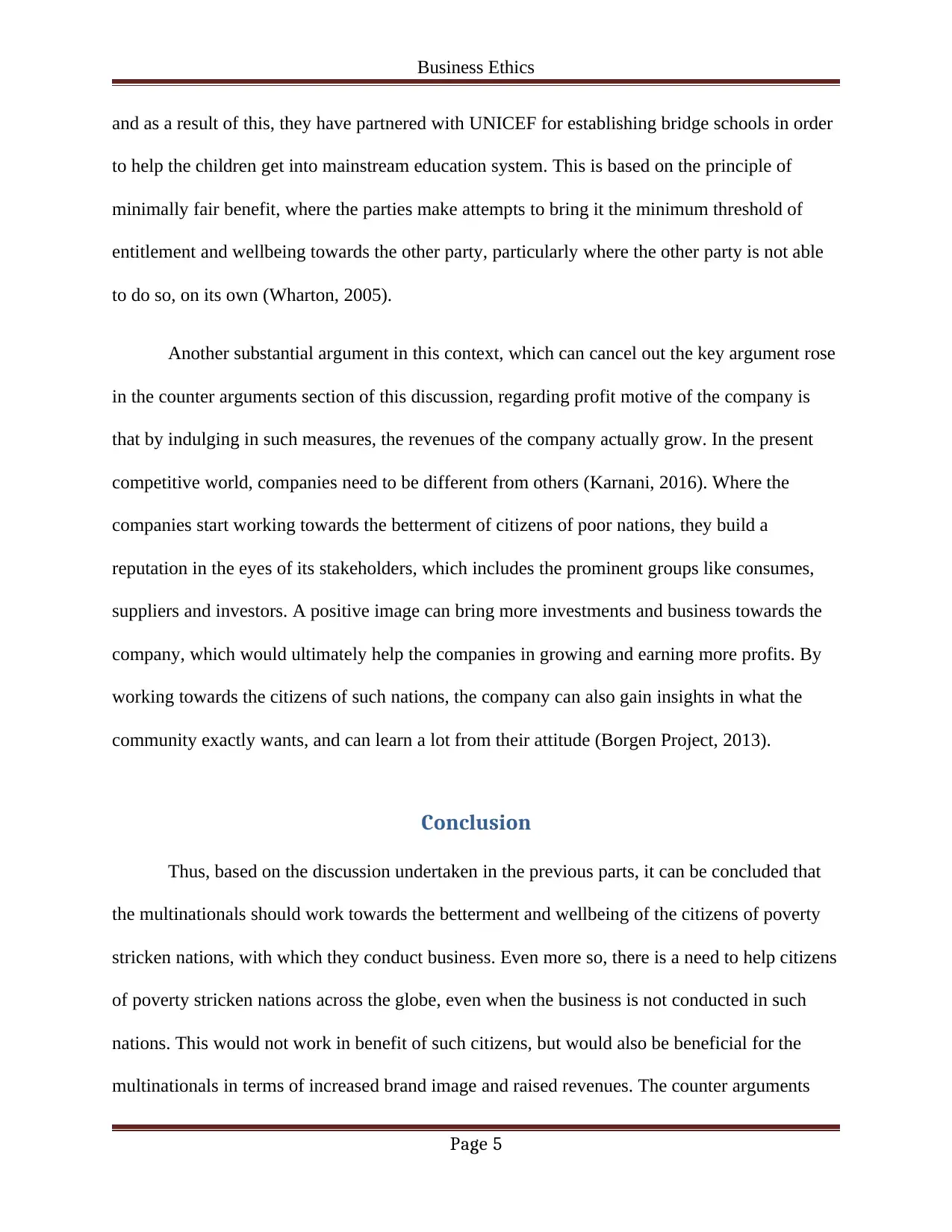
Business Ethics
and as a result of this, they have partnered with UNICEF for establishing bridge schools in order
to help the children get into mainstream education system. This is based on the principle of
minimally fair benefit, where the parties make attempts to bring it the minimum threshold of
entitlement and wellbeing towards the other party, particularly where the other party is not able
to do so, on its own (Wharton, 2005).
Another substantial argument in this context, which can cancel out the key argument rose
in the counter arguments section of this discussion, regarding profit motive of the company is
that by indulging in such measures, the revenues of the company actually grow. In the present
competitive world, companies need to be different from others (Karnani, 2016). Where the
companies start working towards the betterment of citizens of poor nations, they build a
reputation in the eyes of its stakeholders, which includes the prominent groups like consumes,
suppliers and investors. A positive image can bring more investments and business towards the
company, which would ultimately help the companies in growing and earning more profits. By
working towards the citizens of such nations, the company can also gain insights in what the
community exactly wants, and can learn a lot from their attitude (Borgen Project, 2013).
Conclusion
Thus, based on the discussion undertaken in the previous parts, it can be concluded that
the multinationals should work towards the betterment and wellbeing of the citizens of poverty
stricken nations, with which they conduct business. Even more so, there is a need to help citizens
of poverty stricken nations across the globe, even when the business is not conducted in such
nations. This would not work in benefit of such citizens, but would also be beneficial for the
multinationals in terms of increased brand image and raised revenues. The counter arguments
Page 5
and as a result of this, they have partnered with UNICEF for establishing bridge schools in order
to help the children get into mainstream education system. This is based on the principle of
minimally fair benefit, where the parties make attempts to bring it the minimum threshold of
entitlement and wellbeing towards the other party, particularly where the other party is not able
to do so, on its own (Wharton, 2005).
Another substantial argument in this context, which can cancel out the key argument rose
in the counter arguments section of this discussion, regarding profit motive of the company is
that by indulging in such measures, the revenues of the company actually grow. In the present
competitive world, companies need to be different from others (Karnani, 2016). Where the
companies start working towards the betterment of citizens of poor nations, they build a
reputation in the eyes of its stakeholders, which includes the prominent groups like consumes,
suppliers and investors. A positive image can bring more investments and business towards the
company, which would ultimately help the companies in growing and earning more profits. By
working towards the citizens of such nations, the company can also gain insights in what the
community exactly wants, and can learn a lot from their attitude (Borgen Project, 2013).
Conclusion
Thus, based on the discussion undertaken in the previous parts, it can be concluded that
the multinationals should work towards the betterment and wellbeing of the citizens of poverty
stricken nations, with which they conduct business. Even more so, there is a need to help citizens
of poverty stricken nations across the globe, even when the business is not conducted in such
nations. This would not work in benefit of such citizens, but would also be beneficial for the
multinationals in terms of increased brand image and raised revenues. The counter arguments
Page 5
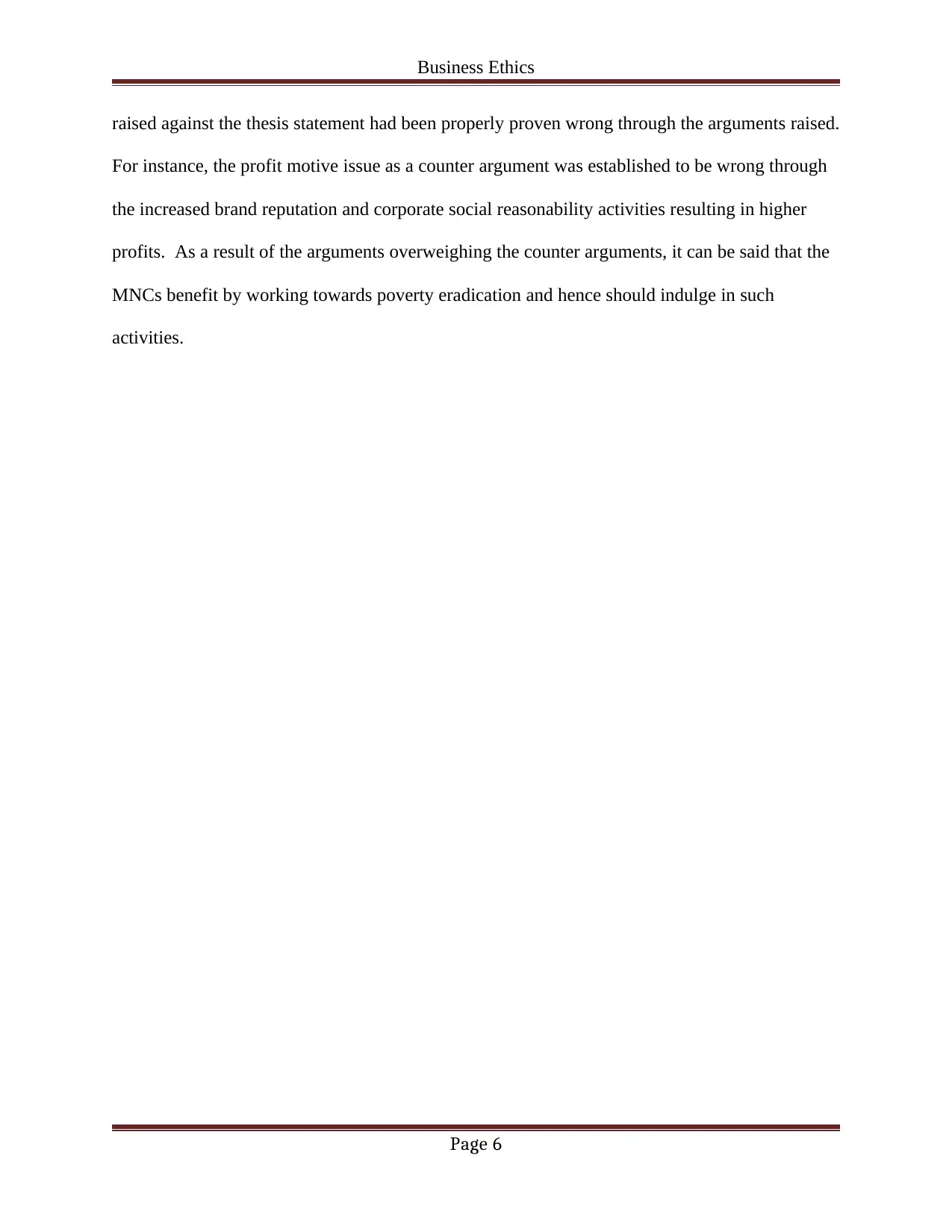
Business Ethics
raised against the thesis statement had been properly proven wrong through the arguments raised.
For instance, the profit motive issue as a counter argument was established to be wrong through
the increased brand reputation and corporate social reasonability activities resulting in higher
profits. As a result of the arguments overweighing the counter arguments, it can be said that the
MNCs benefit by working towards poverty eradication and hence should indulge in such
activities.
Page 6
raised against the thesis statement had been properly proven wrong through the arguments raised.
For instance, the profit motive issue as a counter argument was established to be wrong through
the increased brand reputation and corporate social reasonability activities resulting in higher
profits. As a result of the arguments overweighing the counter arguments, it can be said that the
MNCs benefit by working towards poverty eradication and hence should indulge in such
activities.
Page 6
⊘ This is a preview!⊘
Do you want full access?
Subscribe today to unlock all pages.

Trusted by 1+ million students worldwide
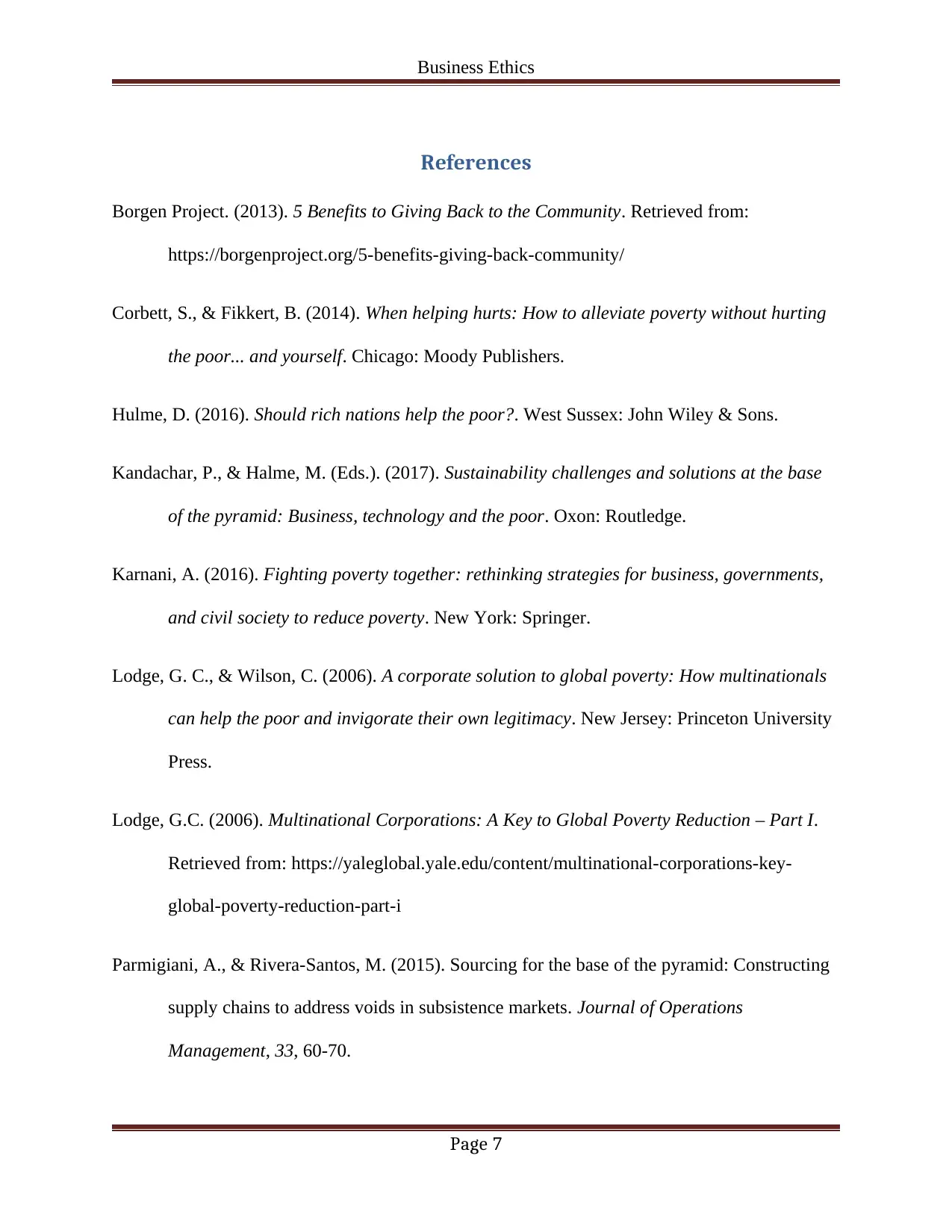
Business Ethics
References
Borgen Project. (2013). 5 Benefits to Giving Back to the Community. Retrieved from:
https://borgenproject.org/5-benefits-giving-back-community/
Corbett, S., & Fikkert, B. (2014). When helping hurts: How to alleviate poverty without hurting
the poor... and yourself. Chicago: Moody Publishers.
Hulme, D. (2016). Should rich nations help the poor?. West Sussex: John Wiley & Sons.
Kandachar, P., & Halme, M. (Eds.). (2017). Sustainability challenges and solutions at the base
of the pyramid: Business, technology and the poor. Oxon: Routledge.
Karnani, A. (2016). Fighting poverty together: rethinking strategies for business, governments,
and civil society to reduce poverty. New York: Springer.
Lodge, G. C., & Wilson, C. (2006). A corporate solution to global poverty: How multinationals
can help the poor and invigorate their own legitimacy. New Jersey: Princeton University
Press.
Lodge, G.C. (2006). Multinational Corporations: A Key to Global Poverty Reduction – Part I.
Retrieved from: https://yaleglobal.yale.edu/content/multinational-corporations-key-
global-poverty-reduction-part-i
Parmigiani, A., & Rivera-Santos, M. (2015). Sourcing for the base of the pyramid: Constructing
supply chains to address voids in subsistence markets. Journal of Operations
Management, 33, 60-70.
Page 7
References
Borgen Project. (2013). 5 Benefits to Giving Back to the Community. Retrieved from:
https://borgenproject.org/5-benefits-giving-back-community/
Corbett, S., & Fikkert, B. (2014). When helping hurts: How to alleviate poverty without hurting
the poor... and yourself. Chicago: Moody Publishers.
Hulme, D. (2016). Should rich nations help the poor?. West Sussex: John Wiley & Sons.
Kandachar, P., & Halme, M. (Eds.). (2017). Sustainability challenges and solutions at the base
of the pyramid: Business, technology and the poor. Oxon: Routledge.
Karnani, A. (2016). Fighting poverty together: rethinking strategies for business, governments,
and civil society to reduce poverty. New York: Springer.
Lodge, G. C., & Wilson, C. (2006). A corporate solution to global poverty: How multinationals
can help the poor and invigorate their own legitimacy. New Jersey: Princeton University
Press.
Lodge, G.C. (2006). Multinational Corporations: A Key to Global Poverty Reduction – Part I.
Retrieved from: https://yaleglobal.yale.edu/content/multinational-corporations-key-
global-poverty-reduction-part-i
Parmigiani, A., & Rivera-Santos, M. (2015). Sourcing for the base of the pyramid: Constructing
supply chains to address voids in subsistence markets. Journal of Operations
Management, 33, 60-70.
Page 7
Paraphrase This Document
Need a fresh take? Get an instant paraphrase of this document with our AI Paraphraser
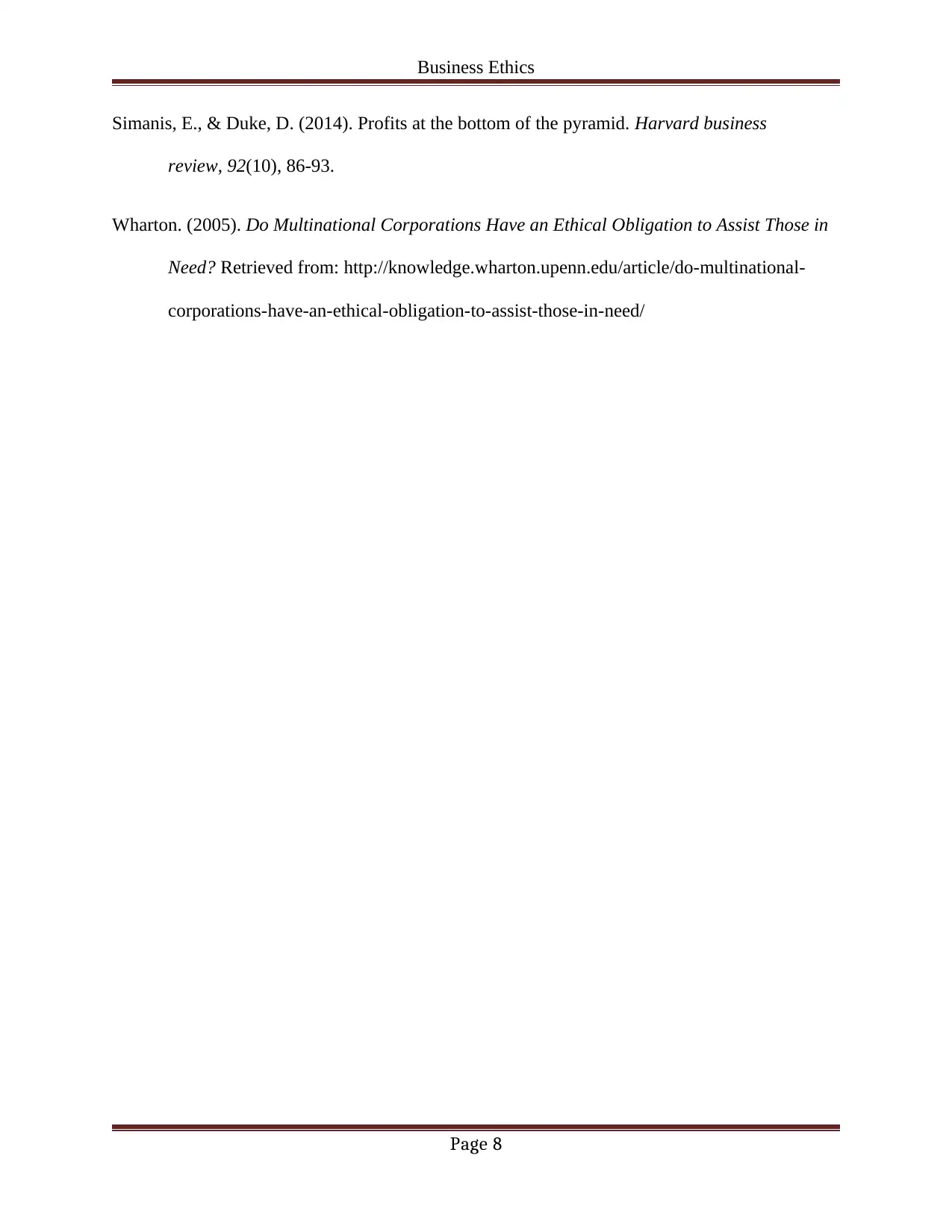
Business Ethics
Simanis, E., & Duke, D. (2014). Profits at the bottom of the pyramid. Harvard business
review, 92(10), 86-93.
Wharton. (2005). Do Multinational Corporations Have an Ethical Obligation to Assist Those in
Need? Retrieved from: http://knowledge.wharton.upenn.edu/article/do-multinational-
corporations-have-an-ethical-obligation-to-assist-those-in-need/
Page 8
Simanis, E., & Duke, D. (2014). Profits at the bottom of the pyramid. Harvard business
review, 92(10), 86-93.
Wharton. (2005). Do Multinational Corporations Have an Ethical Obligation to Assist Those in
Need? Retrieved from: http://knowledge.wharton.upenn.edu/article/do-multinational-
corporations-have-an-ethical-obligation-to-assist-those-in-need/
Page 8
1 out of 8
Related Documents
Your All-in-One AI-Powered Toolkit for Academic Success.
+13062052269
info@desklib.com
Available 24*7 on WhatsApp / Email
![[object Object]](/_next/static/media/star-bottom.7253800d.svg)
Unlock your academic potential
Copyright © 2020–2026 A2Z Services. All Rights Reserved. Developed and managed by ZUCOL.





